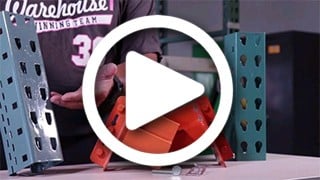How Much Can a Pallet Jack Hold? Guide to Load Capacity, Types, and Safety Tips
Pallet jacks are indispensable tools in warehouses, retail spaces, and industrial settings. But an important factor when choosing the right pallet jack is understanding how much weight it can hold. Whether you’re managing a warehouse or need one for smaller, more specific tasks, this guide will break down everything you need to know about pallet jack load capacities, safety best practices, and how to choose the right type for your operations.
Quick Fact: Did you know that a standard pallet jack can typically carry between 3,000 and 5,500 pounds? However, the load capacity can vary significantly depending on the type of pallet jack.
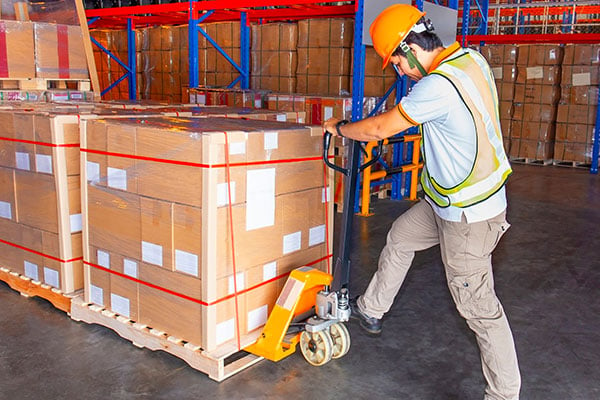
What Is a Pallet Jack?
A pallet jack, also known as a pallet truck, is a tool designed to lift and move pallets within a confined space. Pallet jacks are available in both manual and electric models and are highly valued for their ease of use and ability to handle heavy loads in a variety of environments.
Common Uses of Pallet Jacks:
- Moving pallets in a warehouse
- Transporting products within retail stores
- Stocking or restocking goods in storage facilities
Types of Pallet Jacks and Their Load Capacities
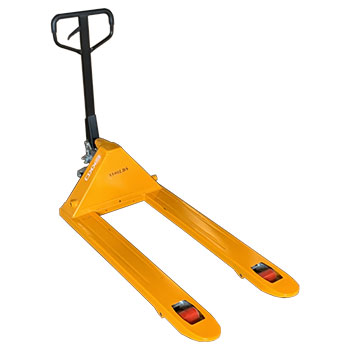 1. Manual Pallet Jacks
1. Manual Pallet Jacks
Manual pallet jacks are the most straightforward type, with a simple pump handle for raising and lowering the forks. They rely entirely on human strength, which limits their load capacity and makes them suitable for smaller-scale operations.
- Standard Load Capacity: 3,000 – 5,500 pounds
- Best Use Case: Small warehouses, retail spaces, or areas with tight aisles
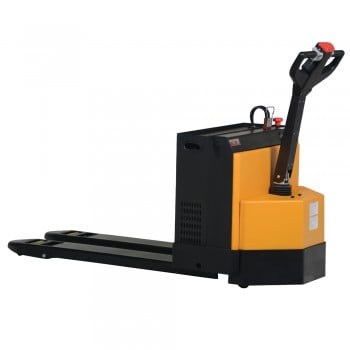 2. Electric Pallet Jacks
2. Electric Pallet Jacks
Electric pallet jacks, or motorized pallet jacks, use a battery-powered motor for increased efficiency and easier operation. They are ideal for larger loads and frequent use, as they reduce the physical strain on operators.
- Standard Load Capacity: 3,000 – 8,000 pounds
- Best Use Case: Larger warehouses, distribution centers, or businesses with high-volume pallet handling
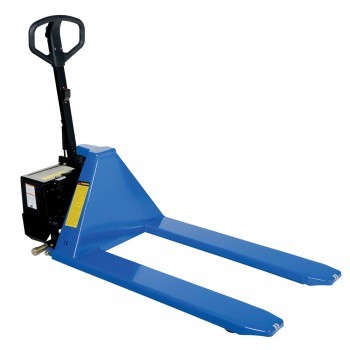 3. Heavy-Duty Pallet Jacks
3. Heavy-Duty Pallet Jacks
For tasks that require moving exceptionally heavy items, heavy-duty pallet jacks are the way to go. These pallet jacks are designed to carry loads that exceed the typical weight limits of standard models.
- Standard Load Capacity: Up to 15,000 pounds
- Best Use Case: Industrial warehouses, manufacturing plants, or heavy-goods transport
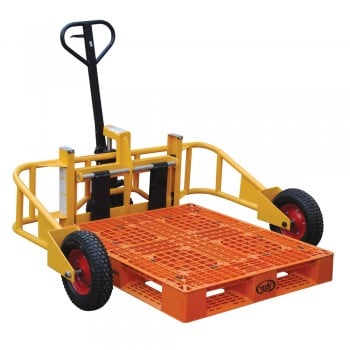 4. Specialty Pallet Jacks
4. Specialty Pallet Jacks
Specialty pallet jacks and trucks are designed to meet unique material handling needs, offering solutions for tasks that go beyond the capabilities of standard pallet jacks.
Some examples of specialty pallet jacks include:
- Low-Profile Pallet Jacks - Designed to handle pallets with a lower clearance height. Typical load capacity: 3,000 to 5,500 lbs.
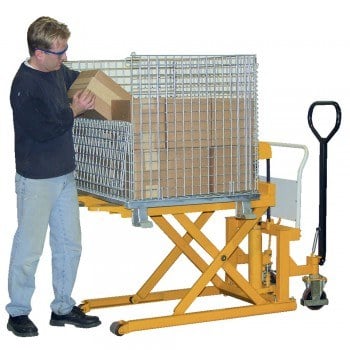 Scissor Lift Pallet Jacks - Combine a pallet jack with a lift table, making them perfect for ergonomic material handling. Typical load capacity: 2,200 to 3,300 lbs.
Scissor Lift Pallet Jacks - Combine a pallet jack with a lift table, making them perfect for ergonomic material handling. Typical load capacity: 2,200 to 3,300 lbs.- Weigh Scale Pallet Jacks - Feature built-in scales to weigh loads during transport. Typical load capacity: 4,400 to 5,500 lbs.
- Rough Terrain Pallet Jacks - Engineered for outdoor use or uneven surfaces like construction sites. Typical load capacity: 2,200 to 4,400 lbs.
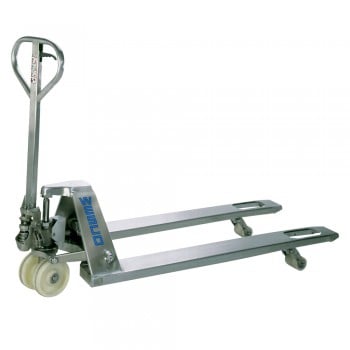 Stainless Steel Pallet Jacks - Built to withstand corrosive environments, such as food processing or chemical handling. Typical load capacity: 4,400 to 5,500 lbs.
Stainless Steel Pallet Jacks - Built to withstand corrosive environments, such as food processing or chemical handling. Typical load capacity: 4,400 to 5,500 lbs.- High-Lift Pallet Jacks - Capable of raising loads to greater heights, often used for stacking or positioning. Typical load capacity: 2,200 to 3,300 lbs.
- Specialized Width Pallet Jacks - Available in narrow or extra-wide configurations for non-standard pallets. Typical load capacity: 4,400 to 5,500 lbs.
For more specifications and information on the pallet jacks you need, contact our team.
Factors That Affect a Pallet Jack's Load Capacity
Several factors impact the load capacity of a pallet jack, and understanding these is key to ensuring you select the right type and maintain safety during operations.
 Type of Material: The materials used in the construction of the pallet jack play a large role in its load capacity. Heavy-duty models are often made of reinforced steel, whereas lighter models may incorporate aluminum.
Type of Material: The materials used in the construction of the pallet jack play a large role in its load capacity. Heavy-duty models are often made of reinforced steel, whereas lighter models may incorporate aluminum.- Fork Length and Width: The dimensions of a pallet jack’s forks affect its stability and load distribution. Longer forks generally distribute weight better and support heavier loads but may be harder to maneuver in tight spaces.
- Wheel Quality: The quality and type of wheels used in a pallet jack can impact its load-bearing ability. High-quality wheels provide better weight distribution and stability.
- Operational Environment: Whether it’s a narrow warehouse aisle or a rough surface, the environment where the pallet jack is used affects its maximum capacity.
- Operator Skill and Training: Proper training in the use of pallet jacks can help avoid accidents and ensure optimal weight distribution.
How to Safely Maximize Pallet Jack Load Capacity
Overloading a pallet jack can lead to safety hazards, equipment damage, and even workplace injuries. Here are some essential tips to ensure safe operation within weight limits:
- Always check the manufacturer's weight recommendations before loading.
- Position the load evenly across the pallet jack's forks to prevent tipping.
- Avoid sudden stops or turns when transporting a loaded pallet jack, as this can cause instability.
- Inspect the pallet jack regularly for wear, especially on the wheels, forks, and hydraulic components.
- Train all operators, emphasizing safe handling and awareness of load capacity.
Explore our Warehouse Safety Tips Guide to dive deeper into best practices for equipment use and operator safety.
Choosing the Right Pallet Jack for Your Needs
Selecting a pallet jack with the right load capacity depends on your specific needs. Here’s a quick guide to help determine the best fit:
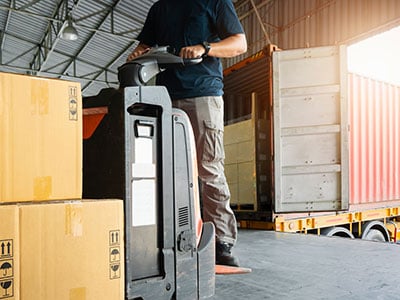 Manual Pallet Jacks: Ideal for small warehouses, retail stores, and lighter loads.
Manual Pallet Jacks: Ideal for small warehouses, retail stores, and lighter loads.- Electric Pallet Jacks: Best for larger warehouses or facilities with frequent, heavy-duty usage.
- Heavy-Duty Pallet Jacks: Perfect for industrial warehouses or manufacturing facilities where high-weight loads are standard.
- Specialty Pallet Jacks: Designed to handle unique applications that standard pallet jacks may not be suitable for.
Still not sure? Contact Warehouse1’s Sales Team for expert assistance in selecting the best pallet jack for your operational requirements.
Additional Considerations: Weight Limit and Pallet Jack Durability
Beyond load capacity, consider factors like durability and long-term use. High-load models may be more cost-effective over time due to their durability in handling heavy weights consistently. Regular maintenance, from inspecting hydraulics to checking wheels, can extend the lifespan of your pallet jack.
Questions to Ask:
- How often will it be used daily?
- Will it be used indoors or outdoors?
- What’s the range of weights it needs to support?
FAQs on Pallet Jack Load Capacity
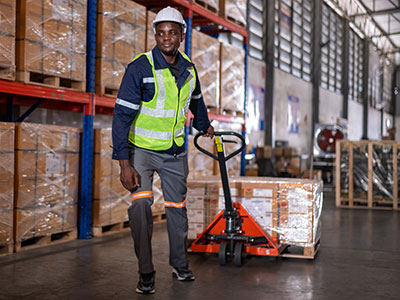 Q: Can a pallet jack lift as much as a forklift?
Q: Can a pallet jack lift as much as a forklift?
A: No, forklifts are designed for much heavier loads and higher lifting heights. A standard pallet jack cannot match a forklift's capabilities in these aspects.
Q: What happens if a pallet jack is overloaded?
A: Overloading can lead to equipment failure, tipping, or serious injury. Always stick to the manufacturer’s load capacity guidelines.
Q: Are there legal regulations for pallet jack load capacity?
A: While OSHA has specific regulations for warehouse safety, the load capacity for pallet jacks is typically determined by the manufacturer’s specifications.
Understanding the load capacity of pallet jacks is essential for operational efficiency and safety in any warehouse or industrial setting. Choosing the right pallet jack and adhering to load limits can optimize workflows and protect your team from potential hazards.
Warehouse1 has a team available with decades of combined experience. Let us tackle your toughest questions and needs.
Our #1 goal is to make sure we take care of you, the customer.
Contact Warehouse1 today for expert care and top-rated pallet jacks. Our team is committed to helping you optimize your storage space and streamline your operations.
Email: Send us a quick message to [email protected] for a custom quote or assistance.
Phone: Give us a call for immediate support, 1-888-558-1830
- Looking for a quote? Click here.
- This free warehouse layout checklist will help you create an effective and efficient layout design for your next big project.
Warehouse1 can provide everything you need to brainstorm, design, engineer, and check off that list to build your warehouse of the future. Below are some of the things we offer.
We Specialize In Custom Warehouse Builds, Utilizing both New and Certified Used Equipment
- Layout Design Services: Our seasoned professionals can design an optimized layout for your warehouse.
- Warehouse Relocation Services: Time is money. Warehouse1 can get your pallet racking out of your old warehouse and set up in your new one, quickly and efficiently.
- Warehouse Liquidation: Going out of business, relocating, or making upgrades? Warehouse1 will purchase your used materials. Give us a call! Let us put some money in your pocket and lighten the workload. We offer fair prices and fast service.
- Engineered & Stamped Drawings: Do you need your project drawings stamped? Warehouse1 has a solution for that as well. We can get your engineered drawing stamped and approved in no time.
- Material Fabrication: Custom builds are in our wheelhouse as well. Our professionally staffed fabrication shop can produce just about anything you need. Call or email us today to see what Warehouse1 can do for you!
At Warehouse1, our commitment is to help you discover the ideal storage solution for your facility. Maximize your warehouse efficiency with our premium pallet rack storage systems and dedicated support.
We look forward to assisting you in optimizing your storage and enhancing your warehouse operations! Contact us today, to get started on improving your warehouse efficiency.



